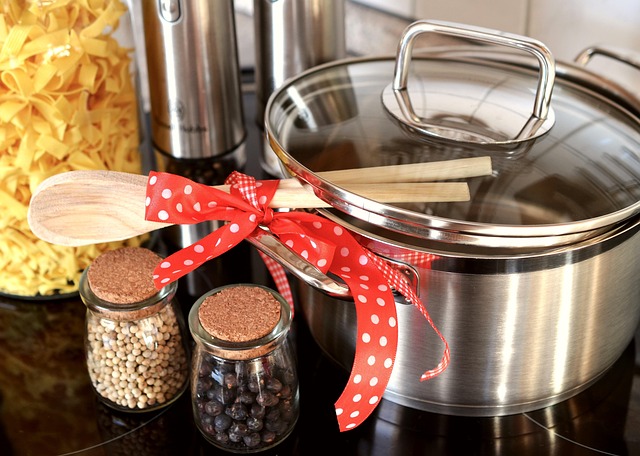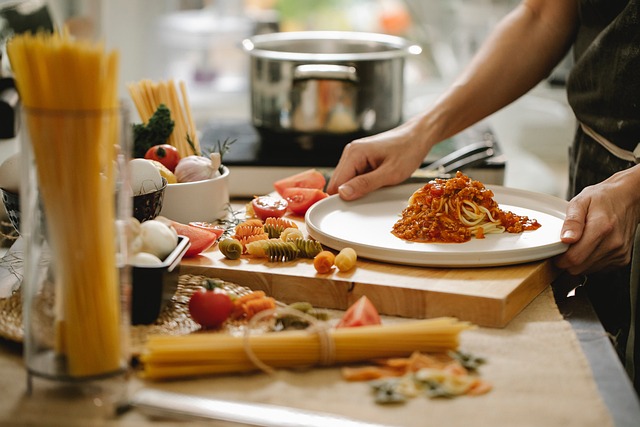Maintaining clean kitchen floors is vital for food safety, hygiene, and aesthetics. Regular cleaning prevents bacteria buildup and enhances the visual appeal of your culinary space. The right tools, techniques, and floor-specific care are key to effective kitchen floor cleaning. Natural, eco-friendly solutions are gentle yet powerful, preserving floor finishes and contributing to a greener home environment. Common mistakes include using harsh chemicals, inadequate disinfection, incorrect tool selection, and haphazard cleaning without considering the floor type. Professional services offer specialized equipment for deep cleaning in commercial kitchens, enhancing food safety and work environment.
Keep your kitchen floor clean and gleaming with our comprehensive guide to full-service kitchen floor cleaning. Discover why regular cleaning is essential for maintaining hygiene and preventing slip hazards. Learn about different types of kitchen floors, each requiring tailored care. Explore effective tools and eco-friendly solutions, and follow our step-by-step guide to deep cleaning. Avoid common mistakes and stay on top of maintenance for a safe, sanitary space.
Understanding the Importance of Kitchen Floor Cleaning

Keeping your kitchen floor clean is more than just maintaining a tidy space; it’s a vital part of food safety and hygiene. Kitchen floors often come into contact with various substances, from raw ingredients to soiled mops, which can leave behind bacteria and contaminants. Regular cleaning helps prevent the buildup of these hazardous elements, ensuring a safe environment for food preparation.
A clean kitchen floor also contributes to a more pleasant overall atmosphere. Free from sticky or slippery residues, it provides better traction, reducing the risk of accidents. Moreover, a sparkling floor gives your kitchen a fresh and inviting look, enhancing its aesthetic appeal. Effective kitchen floor cleaning is thus a game-changer for maintaining a healthy, efficient, and visually pleasing culinary space.
Types of Kitchen Floors and Their Unique Cleaning Needs

Kitchen floors come in various types, each with its own unique characteristics and cleaning requirements. From tile and grout to hardwood and vinyl, understanding these differences is crucial for effective kitchen floor cleaning. For instance, tile and grout floors require more meticulous care due to the porous nature of the materials, which can trap grease, dirt, and moisture. Regular cleaning involves using suitable detergents and tools to scrub away grime while preventing damage. On the other hand, hardwood floors demand a gentler approach to avoid scraping or fading. Specially formulated wood cleaners and microfiber mops are ideal for maintaining their natural beauty and longevity. Vinyl flooring, known for its durability and water resistance, still needs regular vacuuming and spot cleaning with mild solutions to keep it in top condition. Each type of kitchen floor necessitates a tailored cleaning strategy to ensure optimal hygiene and aesthetics without causing harm or wear and tear.
Essential Tools and Equipment for Effective Kitchen Floor Cleaning

When it comes to effective kitchen floor cleaning, the right tools and equipment make all the difference. A good start is a sturdy mop and bucket, ideal for soaking up grease and grime. For tough, stuck-on residue, a scrub brush with durable bristles is essential. Don’t underestimate the power of a squeegee – it’s perfect for quickly removing excess water after mopping, preventing slipping hazards and ensuring faster drying times.
Additionally, consider investing in a floor scrubber or steam cleaner for deep cleaning sessions. These machines effectively remove embedded dirt and bacteria, leaving your kitchen floors sparkling clean and hygienic. Don’t forget about protective gear, like knee pads and gloves, to keep your hands and knees comfortable during the cleaning process.
Step-by-Step Guide to Deep Cleaning Your Kitchen Floor

Deep cleaning your kitchen floor is a necessary task that ensures a hygienic and aesthetically pleasing space. Start by clearing all items off the floor, giving you unobstructed access to every corner. Next, sweep or vacuum thoroughly to remove any loose dirt, debris, or food particles. This initial step prevents scratches and damage while preparing the surface for deeper cleaning.
For more robust kitchen floor cleaning, mix a solution of warm water and mild detergent suitable for hard floors. Dip your mop into the solution and wring out excess water; you want it damp but not soaking wet. Begin mopping from one side to the other in straight lines, ensuring complete coverage. Pay close attention to high-traffic areas and corners where dirt tends to accumulate. After mopping, rinse the floor with clean water using a separate mop or sponge to remove any soap residue. Dry the floor promptly with a clean towel or leave it to air dry, depending on your preference and the flooring type.
Natural and Eco-Friendly Cleaning Solutions for Kitchen Floors

When it comes to kitchen floor cleaning, opting for natural and eco-friendly solutions is both beneficial for your home and the environment. Many commercial cleaning products contain harsh chemicals that can leave residues and potentially impact indoor air quality. In contrast, natural alternatives like vinegar, baking soda, and essential oils are gentle on surfaces yet powerful at cutting through grease and grime. For example, a mixture of white vinegar and water can effectively clean and disinfect kitchen floors while leaving behind a fresh scent.
Using eco-friendly cleaning solutions also reduces the risk of damaging your floor finish. Some chemical cleaners can strip away protective coatings or leave spots, especially on newer or polished flooring. Natural products, however, are typically pH-neutral, ensuring they won’t harm or discolour most floor types. This approach not only keeps your kitchen looking pristine but also contributes to a greener and healthier home environment.
Common Kitchen Floor Cleaning Mistakes to Avoid

Many homeowners overlook kitchen floor cleaning, leading to a buildup of dirt, grease, and bacteria. Common mistakes include relying on harsh chemicals that can damage surfaces or neglecting to disinfect high-traffic areas adequately. Using the wrong tools or not allowing enough time for proper drying can also cause problems, such as slipping hazards and damaged finishes.
Another frequent error is cleaning in a haphazard manner without considering the floor type. Different materials like tile, wood, or vinyl require unique care. For example, using abrasive cleaners on wood floors can scratch the surface, while hot water alone may not effectively remove stubborn stains from tile. Regular mopping without deep cleaning can leave behind grime and germs, so it’s essential to invest time in a thorough yet gentle cleaning routine.
Maintaining a Hygienic and Sparkling Kitchen Floor

Maintaining a hygienic and sparkling kitchen floor is essential for any commercial or residential space. Regular kitchen floor cleaning isn’t just about aesthetics; it’s a critical step in preventing the spread of bacteria and germs that can cause foodborne illnesses. The right approach involves combining effective cleaning solutions with proper techniques.
Using suitable, non-toxic cleaners and hot water is a good starting point. For tough stains and grime, consider using specialized kitchen floor cleaners designed to break down grease and grime without damaging the floor’s surface. Regular mopping and vacuuming are also crucial, especially in high-traffic areas. Remember to dry floors promptly after cleaning to prevent slips and falls, ensuring a safe and clean environment for everyone.
Professional Kitchen Floor Cleaning Services: When to Consider Them

Professional kitchen floor cleaning services are an essential consideration for any establishment that prioritises hygiene and a safe environment. Kitchens, with their high traffic and constant exposure to grease, dirt, and various food substances, require specialised care. Regular mopping and cleaning may not suffice in eliminating deep-seated grime and bacteria. This is where professional kitchen floor cleaning services step in as game-changers.
These services offer comprehensive solutions tailored to the unique needs of commercial kitchens. They employ advanced techniques and equipment designed to tackle tough stains, remove grease buildup, and disinfect surfaces effectively. By entrusting your kitchen floor cleaning to experts, you ensure a deeper clean that enhances food safety and contributes to a more pleasant working environment for your staff.
